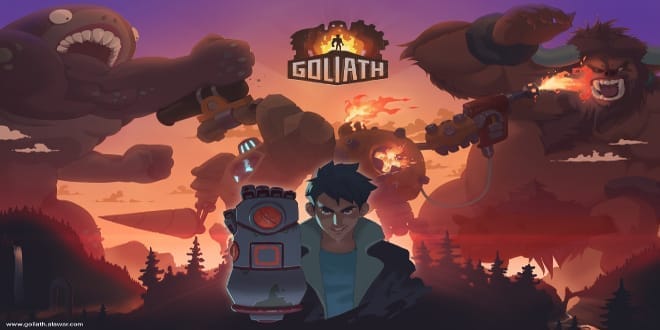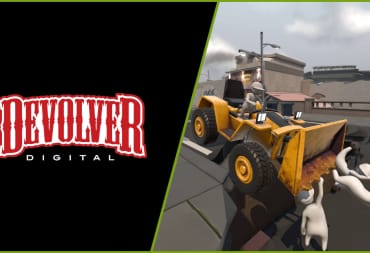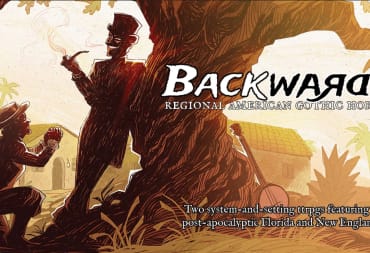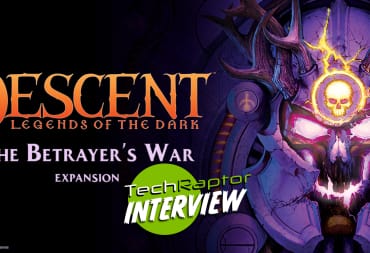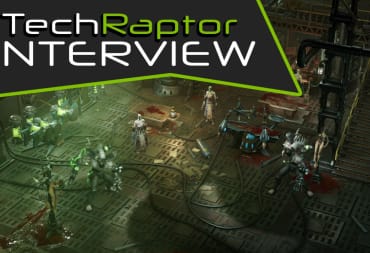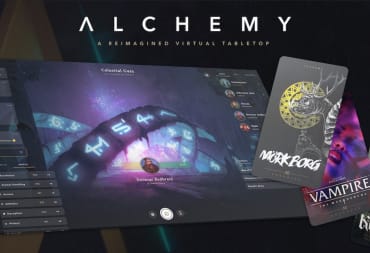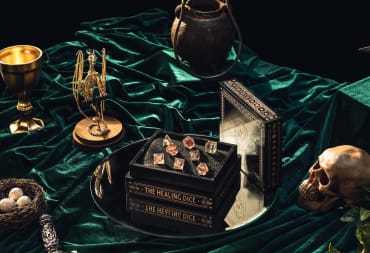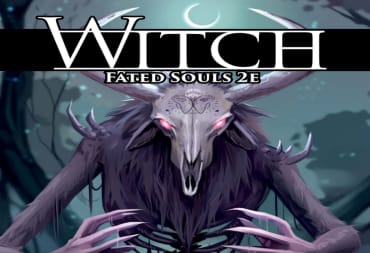TechRaptor recently interviewed Tyler Nagata of Whalebox Studios about their new game, Goliath, a Survival Mech Builder. Goliath is a third-person action-adventure survival game set in a chaotic world filled with monsters. This open world title allows players to build and customize their robots using gathered materials. Goliath is made by Whalebox Studios, a team of experienced indie developers looking to make their first big game.
TechRaptor: So first and foremost, let's get the readers up to speed on Goliath in case they haven't heard about your project yet. In your own words how would describe Goliath as a game?
Tyler: Goliath is story-driven action-adventure video game for PC, Mac and Linux with role-playing elements and, most importantly, the ability to craft giant robots! It’s going to be available early 2016. What does Goliath play like? Like Don't Starve without starving, and with punching monsters in the face while piloting huge robots you've crafted and customized yourself. There are some Borderlands vibes as well from the graphics and multiplayer! That’s one of our favorite parts - you can play Goliath with your friends in co-op mode. Because punching some monsters faces with huge robotic arms together – what a bonding activity!
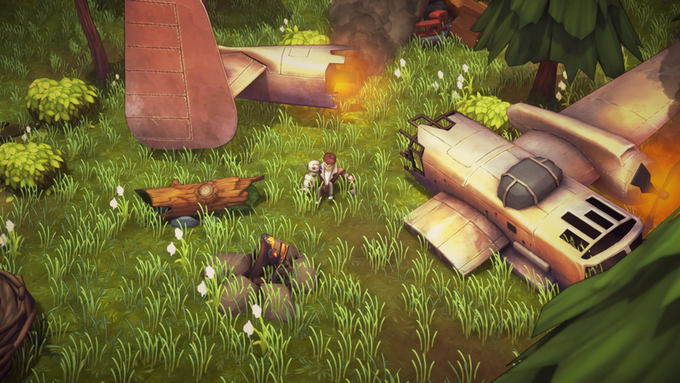
TechRaptor: So where did that original spark come from? At what point during the creative process (if there was one point) did you say "hey, we've got a game here!"
Tyler: We are huge gaming nerds, we’ve been playing all types of games since childhood almost nonstop, and, of course, we’ve always wanted to create games ourselves – I guess it’s the most logical development. We had so many ideas on what to make first that literally we didn’t know how to choose the ONE. Then, in 2013, Don’t Starve came out and we spent huge amount of time in it. It had humor, an original and very unique art style, a great atmosphere of surviving in an unknown world, piles of secrets and hidden gameplay rules – awesome game! And that was it – we found the right ‘push,’ and we were overwhelmed with the idea to create our own game with adventures and fierce battles in mysterious worlds. But Don’t Starve was all about player being weak and vulnerable to almost any interaction with the world.
We wanted our game to be different – in our game we wanted not only explore the worlds, but also to actively engage in battles, become stronger, and meet a lot of NPCs with quests and tasks. First we came up with the idea that in our game, players would be able to construct giant funny-looking robots from all the garbage, debris and other materials found in the ruined world of the game. That seemed like the most logical and thrilling idea, because if we can craft in the game and we want to protect ourselves, why don’t we craft huge robots to punch some monsters! In 2014 we had the opportunity to put plans into action: we all finished up our other work and officially formed Whalebox Studio to build Goliath!
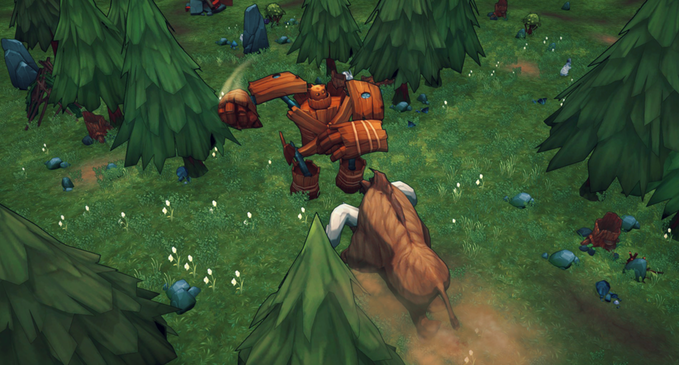
TechRaptor: Your game has a lot of customization elements, from building your Goliath the way you like, to different weapon load outs, the resource and material crafting, and even painting the Goliath by hand! You guys really seem to value player personalization. What made you chose for such a modular take on the adventure game?
Tyler: Well, first of all, if you’re making a game about building robots from garbage and scrap materials and you cannot customize these robots and upgrade their details, you are doing something very wrong with your game! Customization is the first thing you’d want to do after the construction of your first robot! Or maybe the second thing, taking into account that you’d probably want to punch some monsters first! So we made this decision at an early stage.
In addition, we paid a lot of attention to the battle system of the game. Combat is an integral part of our adventure. And to make the battles even more varied and interesting, we allow players to choose among hundreds of options - each new Goliath part the player can build has some advantage or has important features. You can make your robot fire resistant, give it new long- range attack bonuses, or sacrifice its speed to greatly increase its strength. And we hope that the players will be able to spend a lot of time trying to find the most effective combinations that we came up with. We want players to experiment!
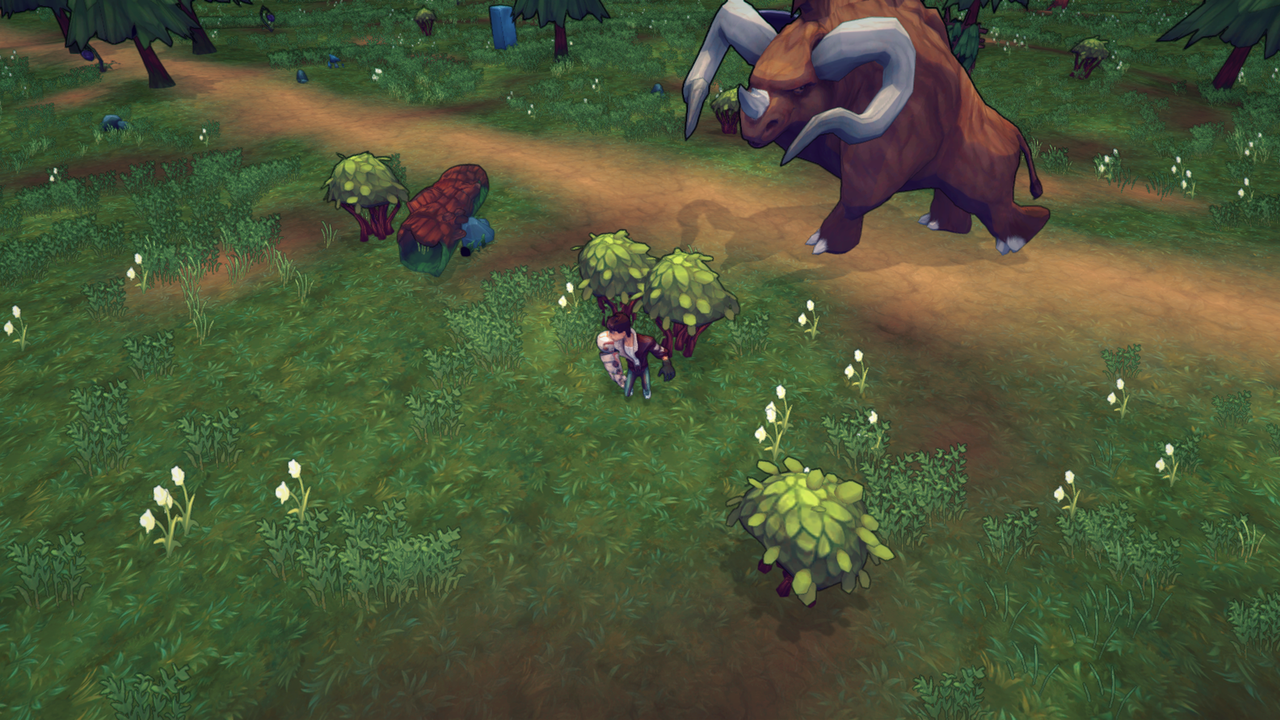
TechRaptor: Having an open world presents a plethora of opportunities, and challenges, to the independent developer. How do you plan to make use of the extra breathing room and gameplay mechanics available in open world games? What challenges, if any, came with the decision to make the game open world?
Tyler: Open worlds are really a great opportunity for the players, but it’s also a big headache for the developer. Our main task was to make sure that no matter where players have decided to go, and what world they went to investigate, they were always be able to get a lot of surprises, rewards and quests. The huge help for us here is our procedural generation system - the game should keep players’ interest, regardless what player is occupied with or where they’re headed to.
Even if you just go to hunt in one of dozens of worlds available, the game will create additional tasks for you and will be able to prepare a few surprises and special mini-bosses. We have to produce a lot of content and game conditions for the generator to operate with, but the result is worth it. Wherever you go there will always be something to do, even if you have decided to ignore the storyline. In addition, many side quests, even small one, can lead to large consequences, lead you to new friends or companions, or open the way to new worlds and new adventures. The main challenge for us is to make it all work flawlessly! The generator itself does not know how to make interesting staff for the player – that’s where we come in!

TechRaptor: In the Kickstarter page it mentions that everything in the world has an effect on how your Goliath performs, including weather and terrain! Could you talk a little on how your Goliath would be affected by these elements?
Tyler: Each world has its own characteristics. The key ones are the temperature, the precipitation, and the nature of the soil. Each Goliath type is affected by these differently. In every type of climate, there is a Goliath type that is affected negatively and another that’s affected positively. Our objective was to make sure that these effects were interesting and at the same time logical. If you suddenly start to receive damage and do not understand why, that’s not very cool, right? For example, in areas with high temperatures - in the desert or a fiery world, wooden Goliath will heat up and can ignite. However, the stone Goliath after heating up receives bonus fire damage to its attacks, and iron ones - since in the center of every iron Goliath there is a sort of a furnace – gets a speed boost from generating more power. If the temperature drops, the stone Goliath gets a crust of ice, which gives it extra protection. In the rain the wooden Goliath regrows and heals damage, and the iron Goliath can rust. But a direct hit of lightning, which is dangerous for the majority of the robots, gives the crystal Goliath huge burst of energy for all combat powers.
As for the soil, it is quite simple: the lower the weight of Goliath, the easier it is to navigate through a viscous soil, such as sand or swamp. And these bonuses and penalties are there for all environmental conditions. However, the players always carry with them up to three different Goliath's, and all effects are logical and clearly reflected in the interface, so that players can always use the weather and environmental conditions to their advantage.

TechRaptor: How does a story-driven campaign work in a procedurally generated game? Did the team know early on they were going to make the game procedurally generated? Did this decision come before, after, or at the same time when deciding to make the game open world?
Tyler: We’ve decided that we’re going to use procedural generation and have the open world in the game from the very beginning - it worked well in Don’t Starve, FTL and other games, as well. We pretty much had the idea how to implement it and how it will help us: we wanted a world that could surprise even us, a world that could create a unique adventure every time. Of course, in the case of a story-driven game with quests you need constantly ensure that the world is being generated with all the rules, story sequences and necessary interactions. For example, if you’ve received a procedurally generated quest with the goal you cannot get to, because along the way there is monster that’s unbeatable to you at the moment, it's not very good. We don’t want that to ever happen. So we created lots and lots of rules and planning. We create about 50 worlds with a set of natural areas and their inhabitants.
The player does not have access to all the worlds at once - we artificially limit the number of worlds available with plot tasks. These worlds are being filled with storyline tasks with key points that open up as the player makes progress. Then we arrange additional tasks up to the point where the game is full of them more or less evenly, and each world had its challenges. After that, we scatter all over the world very small and casual tasks and random encounters, and then arrange powerful monsters. In the end, it works out that in order to open access to all the content, you have to follow main storyline, while random and non-random adventures are waiting for players in already discovered worlds.

TechRaptor: What experience in game creation does the Whalebox team have? What projects have the team members been involved with?
Tyler: Goliath is our first big game. Everyone at Whalebox Studio worked on a casual and flash games before. We have worked with companies like Alawar, Realore and others. The shipped games our team members have worked on are mostly time management games - like Viking Brothers, the Northern Tale series and others. The production team has been involved in work on a variety of different genres of casual games - series like Farm Frenzy, The Treasures of Montezuma and plenty of casual adventure games.

TechRaptor: Why did the team chose to fund the game through Kickstarter, rather than through traditional funding measures?
Tyler: We are lucky to have funding for the basic part of the game and to be able create a great game. However, with the help of Kickstarter, we can make the game even better and bring it closer to our ideal vision of how we initially imagined it – with more depth, more content, more complex worlds - which is why we decided to ask players for support. We hope to make the game together with those who like our ideas, who like giant homemade robots and like the way we are making our game.
And, of course, Kickstarter allows you to explore the fascinating and very active audience, people who not only love games, but love the process of development and possibility of participating in it, who like to follow the behind the scenes action, the process of creating games. We are very glad to get acquainted with our backers, very glad to have new subscribers on Twitter and Facebook, and are looking forward to making many new friends!
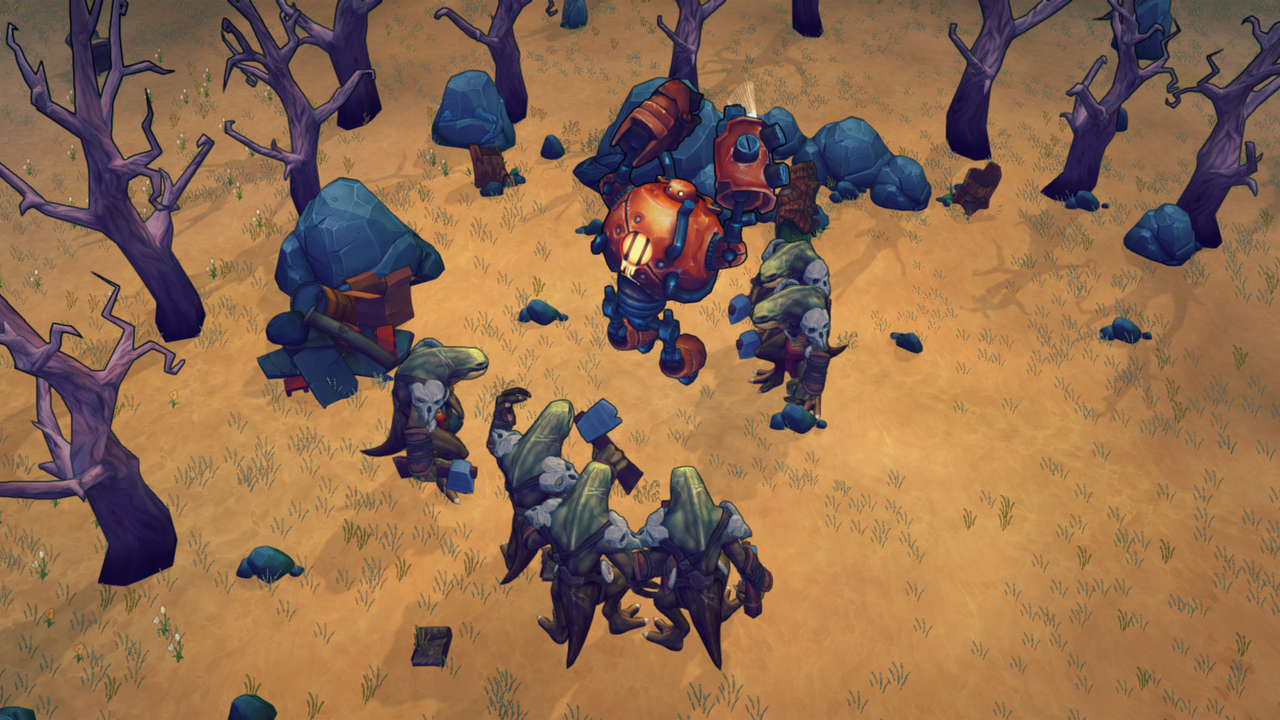
TechRaptor: If Goliath is successfully funded, would Whalebox be interested in funding future games through crowdfunding?
Tyler: Crowdfunding provides excellent opportunities to communicate with the audience and gives invaluable feedback. And, of course, it imposes a huge responsibility - because you are directly funded by people, they wait for you to meet all of their best expectations. Right now we have a very interesting experience. On whether we are going to use in crowdfunding for future games – it depends on the game, actually - if we see how exactly we can make the game even better, more interesting with the support of the crowdfunding – sure. That’s how it was and is with Goliath.
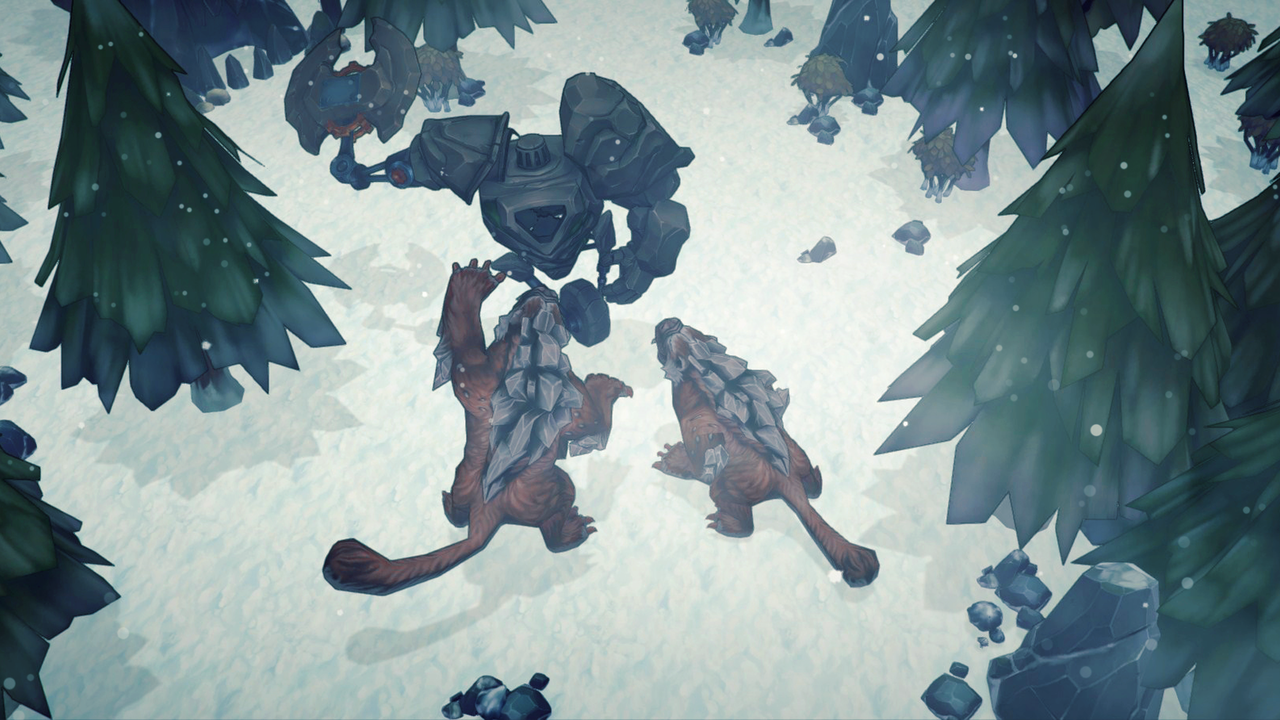
TechRaptor: Do you think the video game industry has a future in crowd funding? Is this the "next big thing" for game development or just an additional avenue for game makers to consider?
Tyler: I really like that thanks to crowdfunding, we see more games supported that go beyond the indie criteria, because they require a lot of money to develop, and at the same time are much more original than major publisher can afford to produce. So we believe in crowdfunding and that it will have a big impact on the game industry. I also hope that we, the developers, will encourage the community with our games, and will continue to demonstrate that crowdfunding can help really great projects see light.
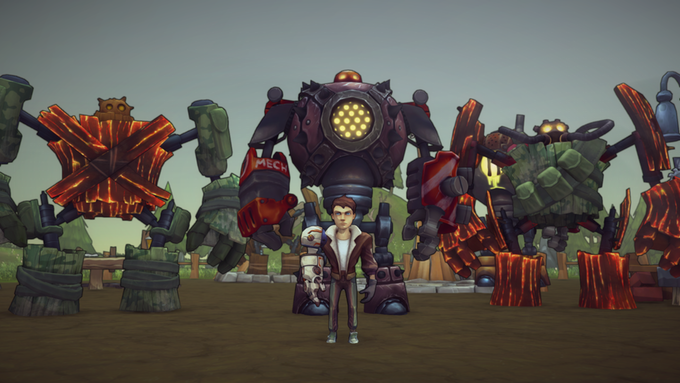
TechRaptor: I commend you guys on making such a firm promise that Goliath will release in the first half of 2016, Kickstarter projects tend to be known for their visions rather than their commitments, and as we've seen with the controversy surrounding the Mighty No.9 and Red Ash Kickstarters, people have begun to take notice of this. What makes you feel confident you can release the game on time?
Tyler: We’ve already have done a great amount of work and now we know exactly what we need to do and how. At the prototype stage, for example, estimates of release can be very inaccurate. In our case, we are quite far enough in the development, to be that sure. Although not so sure to assign the exact day – which seems to be bad omen nowadays anyway, so it’s ok, I guess. Of course, there may be unexpected force majeure or disasters, but we have carefully considered all the risks and we are now confidently moving to the end of the game and release.

TechRaptor: Thank you so much for taking the time to answer our questions!
Tyler: Thank you, TechRaptor, for your questions and sincere thanks to your readers for their interest in our game! Support is extremely important for us right now. We will be happy to see you on Facebook, get letters from you with questions and suggestions. Follow our campaign on Kickstarter! Let's build giant robots together!
Have a tip, or want to point out something we missed? Leave a Comment or e-mail us at tips@techraptor.net
